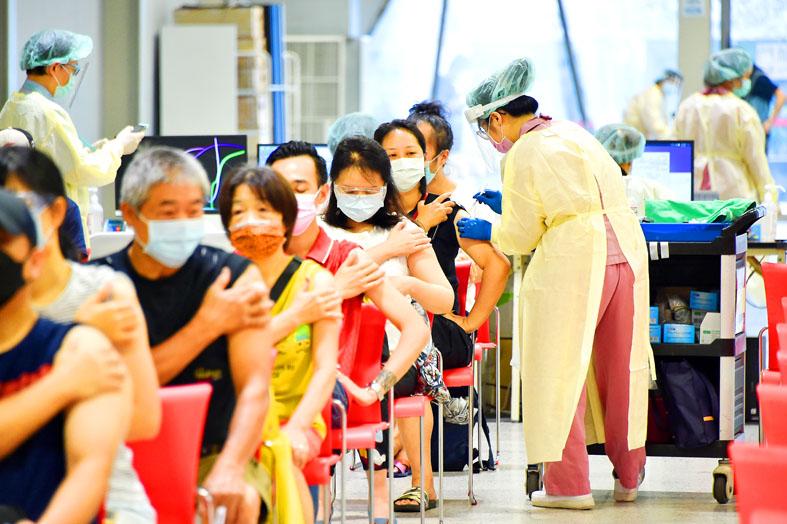The Taipei City Government is considering buying COVID-19 vaccines and is to meet within a week to discuss the issue, it said yesterday.
Although the central government has nominally obtained 75 million doses of COVID-19 vaccines, either through purchase agreements or donations, only 9.5 million doses have arrived in Taiwan, Taipei Deputy Mayor Tsai Ping-kun (蔡炳坤) said.
The city government is considering purchasing its own supply of vaccines, as it might need to provide residents with booster shots to better protect them against SARS-CoV-2 variants, Tsai said.

Photo: Tu Chien-jung, Taipei Times
Such an acquisition would cost at least NT$6 billion (US$215.7 million), he said.
If the Taipei City Government decides to buy vaccines, it — and subsequent matters such as the number of doses needed — would be deliberated and ratified by the city council, he added.
The city government must also consider the efficacy of a booster shot and a potential backlash from residents should the central government seek to expropriate any vaccines the city purchased with its own funds, Tsai said.
The Taipei City Government would meet within a week and invite experts to assess the situation, he said, adding that the assessment would be used to make a final decision.
Last month, local media reported that the city government could acquire vaccines through collaboration with a large hospital in central Taiwan facilitated by Tsai; by purchasing Novavax COVID-19 vaccines, which would be facilitated by Taiwan People’s Party member Chou Chung-chi (周鐘麒); or through collaborations with pharmaceutical companies of a certain size and the Taipei Department of Health.
Tsai said that the city government could obtain vaccines through one of those methods, but that funding and other issues must be dealt with first.

Taiwan is stepping up plans to create self-sufficient supply chains for combat drones and increase foreign orders from the US to counter China’s numerical superiority, a defense official said on Saturday. Commenting on condition of anonymity, the official said the nation’s armed forces are in agreement with US Admiral Samuel Paparo’s assessment that Taiwan’s military must be prepared to turn the nation’s waters into a “hellscape” for the Chinese People’s Liberation Army (PLA). Paparo, the commander of the US Indo-Pacific Command, reiterated the concept during a Congressional hearing in Washington on Wednesday. He first coined the term in a security conference last

Prosecutors today declined to say who was questioned regarding alleged forgery on petitions to recall Democratic Progressive Party (DPP) legislators, after Chinese-language media earlier reported that members of the Chinese Nationalist Party (KMT) Youth League were brought in for questioning. The Ministry of Justice Investigation Bureau confirmed that two people had been questioned, but did not disclose any further information about the ongoing investigation. KMT Youth League members Lee Hsiao-liang (李孝亮) and Liu Szu-yin (劉思吟) — who are leading the effort to recall DPP caucus chief executive Rosalia Wu (吳思瑤) and Legislator Wu Pei-yi (吳沛憶) — both posted on Facebook saying: “I

The Ministry of Economic Affairs has fined Taobao NT$1.2 million (US$36,912) for advertisements that exceed its approved business scope, requiring the Chinese e-commerce platform to make corrections in the first half of this year or its license may be revoked. Lawmakers have called for stricter enforcement of Chinese e-commerce platforms and measures to prevent China from laundering its goods through Taiwan in response to US President Donald Trump’s heavy tariffs on China. The Legislative Yuan’s Finance Committee met today to discuss policies to prevent China from dumping goods in Taiwan, inviting government agencies to report. Democratic Progressive Party Legislator Kuo Kuo-wen (郭國文) said

The Ministry of Economic Affairs has fined Taobao NT$1.2 million (US$36,900) for advertisements that exceeded its approved business scope and ordered the Chinese e-commerce platform to make corrections in the first half of this year or its license would be revoked. Lawmakers have called for stricter supervision of Chinese e-commerce platforms and more stringent measures to prevent China from laundering its goods through Taiwan as US President Donald Trump’s administration cracks down on origin laundering. The legislature’s Finance Committee yesterday met to discuss policies to prevent China from dumping goods in Taiwan, inviting government agencies to report on the matter. Democratic Progressive Party